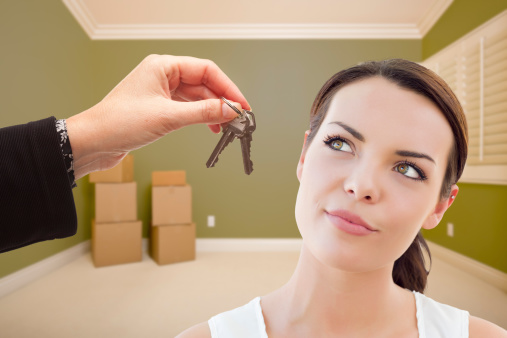It may seem like all you need to sell a home is the smell of freshly baked bread in the kitchen and a ‘for sale’ sign in your garden but the process is far more complex. Rebekah Commane gives a breakdown of the main steps to take when selling your home for the first time
When it comes to property related challenges, buying a first home certainly gets the lion’s share of attention in terms of advice available and general assistance from others who have been to the process. However, selling a property for the first time can be as much of a challenge and it’s wise to do be aware of all the best way to go about it before getting the ball rolling.
While it may seem from certain property programmes that all you need to sell your house is a bunch of fresh flowers on your kitchen table and some coffee on the brew, the process is far more complex and you should start planning months before you intend to put the property on the market.
 The great news for house sellers is that the numbers interested in moving home has risen significantly in the last 12 months. According to research from Clydesdale and Yorkshire Banks, the number looking to move in 2014 rose from 7 per cent to 14 per cent, with the highest percentage of these potential home buyers in the London area.
The great news for house sellers is that the numbers interested in moving home has risen significantly in the last 12 months. According to research from Clydesdale and Yorkshire Banks, the number looking to move in 2014 rose from 7 per cent to 14 per cent, with the highest percentage of these potential home buyers in the London area.
And with an increase in demand comes an increase in the amount for which you can put your property on the market so, depending on when and where you bought your home, you could be in to make a substantial profit.
Is selling the right move?
First off, consider whether you really want and need to move and if you are in a good place financially and personally to do so. Remember that while it could be a good time to sell due to demand, it may not be the best time to buy, so the next house you purchase may also have an inflated price tag in this environment.
If you want to move due to space requirements, first consider extending your current home if you have room to do so. If you need to downsize because of financial constraints remember that selling in itself can be an expensive process so exhaust all other revenue sources, such as taking on a lodger, first.
Costs
To ensure you’re 100 per cent happy with your decision to move first consider all of the costs involved.
You’ll be in a better financial position if you have enough equity in your current property to cover the deposit for your new home but there are many more expenses involved.
Some of the main costs to consider when buying a property include legal (conveyancing) fees, valuation fees, the cost of a survey to ensure the building is in good repair, stamp duty, buildings insurance and other fees that may be charged by your mortgage lender.
Then there are the costs of selling; which will also include conveyancing charges. Property company Move with Us advises instructing a conveyancer of your intentions to sell as you put your home on the market, rather than waiting until an offer has accepted so as not to slow down the moving process.
There will also be fees of around 2 to 3 per cent of the selling price if you use and estate agency and about 2 per cent if you sell at auction. Of course you can sell privately and you will then just have the costs of advertising the sale but it may be a more time consuming option.
Another expense involved in selling a house is to provide potential buyers with an Energy Performance Certificate (EPC). This will demonstrate the energy efficiency of the property with ratings from A to G. The EPC is produced by an accredited domestic energy assessor.
Try to ensure that the certificate is available within 7 days of the property being put on the market. You can arrange to have an EPC through your estate agent or independently with an EPC provider.
How much should you sell for?
When it comes to pricing your property it can be tempting to shoot for the stars with the aim of accepting lower offers but by doing this you could price yourself out of the market and potential buyers won’t find your home when searching in their price bracket. Look at the other properties for sale in the vicinity with a similar spec and expect to ask around that amount.
Halifax recommends having three separate estate agents value your property and asking them for three figures:
- The highest price they think you could get
- The price they think you should ask for
- The price they think you’ll receive.
Put your best features forward
You may have a love for all things pink but remember that potential buyers will want to imagine their own belongings fitting in to the house so de-clutter and tidy away as many personal possessions as you can. Also make sure the house is clean inviting when holding viewings and try to avoid having a lot of people or pets around to get in the way. If possible, give the place a new coat of paint and have carpets cleaned.
Don’t forget about outside of the house because this will be the potential buyers’ first impression of the property.
If you are using an estate agent leave them to guide the viewings and try to vacate the property so that buyers feel more comfortable looking around. If you’re giving the tour yourself you should start by showing off any room in the house that has exceptional light or any particularly attractive feature, lead with this if you are giving the tour yourself.
Who to sell to
The best buyer is not always the person who offers the highest price. It’s up to you who you sell to and you may want to consider whether they are a first time buyer, if they have a buyer for their own property, when they want to move, etc, to give you an idea of how long the process will take.
Also key will be how they are financing the purchase. Cash buyers will be the least complicated whereas for those getting a mortgage you should ask to see the ‘mortgage in principle’. This is easier if you are using an agent as they will act as the middleman and check all of these things on your behalf.
Know which of your belongings in the property you want to bring with you to your next home and what you will leave behind as any extras may clinch a deal with buyers.
You will want to see the sale go through as quickly as possible to ensure you get the price offered and that haggling doesn’t continue. Keep in regular contact with your conveyancer so you know where the process is at.
When contracts are exchanged, and before completion, the buyer may wish to visit the house again to assess what changes they want to carry out, but don’t allow this to happen before completion.
Inform your energy companies that you are leaving and ask that any final meter readings be carried out on completion day. Also contact the relevant council to which you pay rates.
Now is good time in the property market to be a home seller so once all the boxes are ticked you can start packing them and take the next step on the property ladder!




